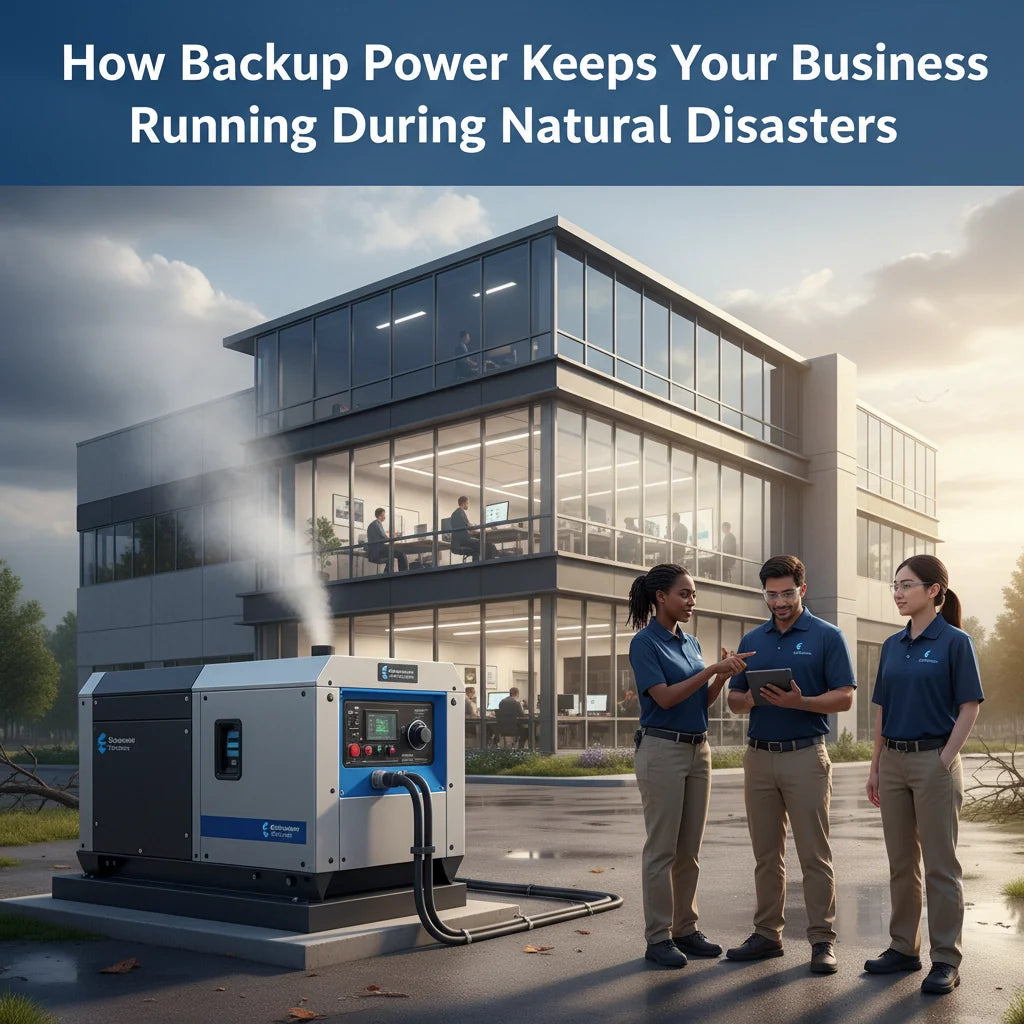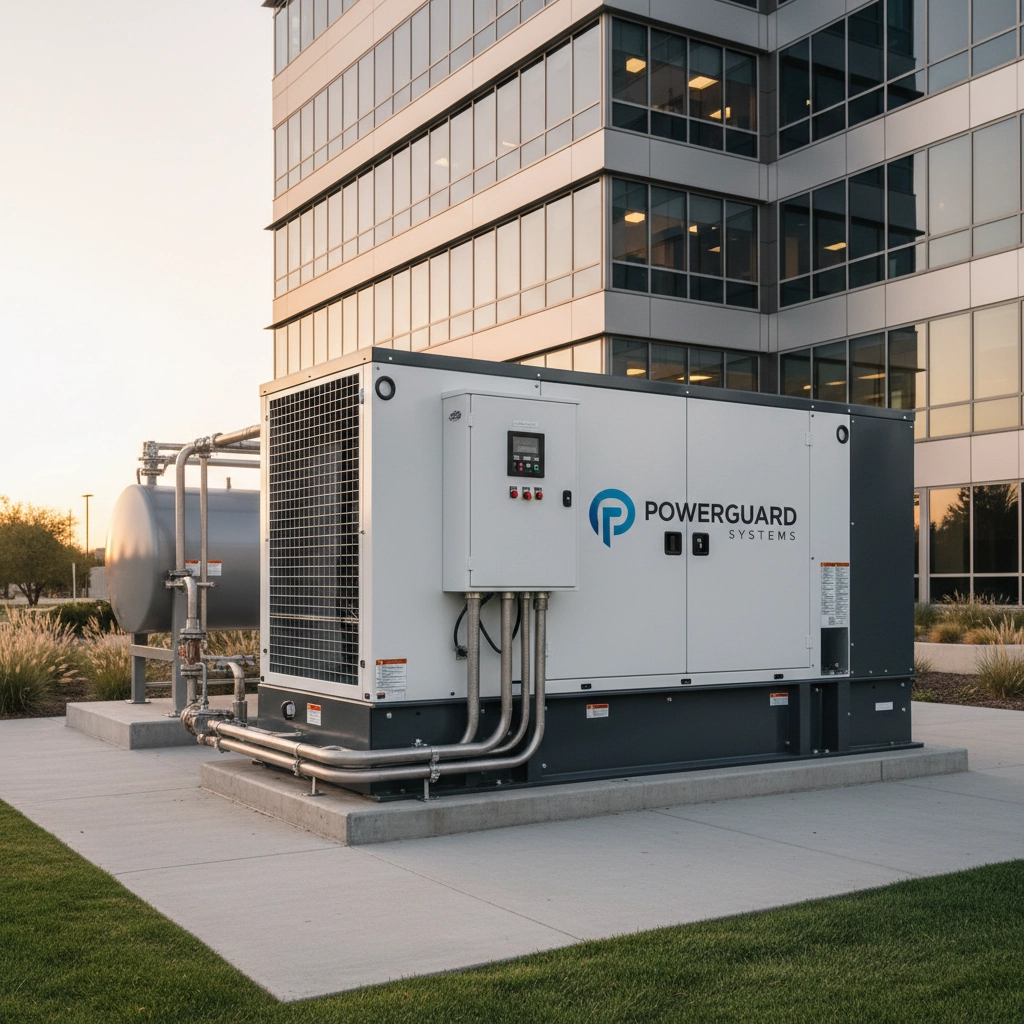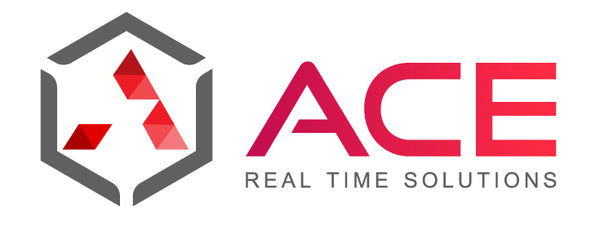
How Backup Power Keeps Your Business Running During Natural Disasters
Share
When Mother Nature unleashes her fury, your business doesn't have to become another casualty. Natural disasters strike with little warning, leaving millions of businesses in the dark, literally. But here's the thing: while you can't control when a hurricane will hit or when an earthquake will shake your foundation, you absolutely can control whether your business stays operational when the lights go out.
The reality is stark. According to recent studies, 40% of small businesses never reopen after a major disaster. But the businesses that do survive? They're the ones that planned ahead with reliable backup power systems. Let's dive into how the right power protection strategy can be the difference between closing your doors forever and staying ahead of the competition when disaster strikes.
The Silent Business Killer: Power Outages During Disasters
Picture this: You're running a successful operation when a severe storm rolls through your area. The power grid fails, and suddenly everything stops. Your computers shut down mid-transaction, your security systems go dark, your climate-controlled inventory starts deteriorating, and your employees are left sitting in the dark wondering what comes next.
This isn't just an inconvenience: it's a business emergency. Every minute without power translates to lost revenue, damaged equipment, compromised data, and frustrated customers who might never come back. The cascading effects can be devastating, especially when you consider that major disasters often leave entire regions without power for days or even weeks.
But businesses with proper backup power systems? They keep humming along while their competitors struggle to get back online.
Your First Line of Defense: UPS Systems

Uninterruptible Power Supply (UPS) systems are like insurance policies that actually work when you need them most. These battery-powered workhorses kick in the instant your main power fails, providing seamless protection for your critical equipment.
Here's why UPS systems are essential during natural disasters:
- Instant activation: No delay, no interruption: your equipment stays powered
- Clean power delivery: Protects sensitive electronics from power surges and fluctuations
- Graceful shutdowns: Gives you time to properly save data and shut down systems
- Bridge to generators: Keeps everything running while backup generators start up
Whether you're running a small office or managing a data center, UPS systems from trusted brands like APC by Schneider Electric and CyberPower offer the reliability you need when disaster strikes. These systems range from compact desktop units protecting individual workstations to industrial-grade installations safeguarding entire facilities.
The Heavy Hitters: Standby Generators
While UPS systems handle the immediate emergency, standby generators are your long-term survival strategy. These powerful systems automatically detect when utility power fails and seamlessly take over, running on diesel, natural gas, or propane to keep your business operational for days or weeks if necessary.
The beauty of modern standby generators lies in their automation. Within seconds of detecting a power outage, the transfer switch activates the generator, and your business continues operating as if nothing happened. Your employees keep working, your equipment stays protected, and your customers remain served.
Key considerations for generator selection include:
- Fuel type and availability: Natural gas offers unlimited supply if lines remain intact, while diesel provides independence but requires fuel storage
- Load capacity: Ensuring your generator can handle your essential systems plus some growth
- Transfer switch quality: The brain of the system that makes the seamless transition possible
- Maintenance requirements: Regular servicing keeps your system ready when disaster strikes
Real-World Impact: What Backup Power Actually Protects

Let's get specific about what backup power protection means for your business during a natural disaster:
Data and Digital Assets: Every transaction, customer record, and digital file represents value. Power failures during disasters can corrupt databases, wipe out work-in-progress, and destroy years of accumulated business intelligence. Backup power ensures your servers stay online and your data remains safe.
Climate-Sensitive Inventory: Restaurants, medical facilities, and retailers often stock temperature-sensitive products. When the power goes out, refrigeration fails, and thousands of dollars in inventory can spoil within hours. Backup power keeps your cooling systems running, protecting your investment.
Security Systems: Disasters often coincide with increased security risks. Backup power keeps your alarm systems, cameras, and access controls operational, protecting your physical assets when you need security most.
Communication Infrastructure: Staying connected with employees, customers, and emergency services is crucial during disasters. Backup power ensures your phones, internet, and communication systems remain functional when traditional infrastructure fails.
Manufacturing and Production: For businesses with continuous processes, unexpected shutdowns can damage equipment, waste raw materials, and disrupt production schedules for weeks. Backup power maintains these critical processes during utility outages.
Planning Your Disaster-Ready Power Strategy
Effective disaster preparedness isn't just about buying equipment: it's about creating a comprehensive power protection strategy tailored to your specific needs.
Assessment Phase: Start by identifying your critical systems. What absolutely must stay online during an emergency? This might include servers, security systems, essential lighting, and climate control. Understanding your true power requirements prevents over-investing in unnecessary capacity or under-investing in critical protection.
Scalable Solutions: Your power protection strategy should grow with your business. Modular UPS systems and generators allow you to start with essential protection and expand as needed. This approach makes disaster preparedness more affordable while ensuring future flexibility.
Integration and Testing: The best backup power system is worthless if it doesn't work when needed. Regular testing ensures your equipment functions properly, your staff knows their roles, and your systems integrate seamlessly during an actual emergency.

Fuel and Maintenance Planning: Generators are only as reliable as their fuel supply and maintenance schedule. Establish relationships with fuel suppliers, create maintenance schedules, and ensure your staff understands basic operation and troubleshooting procedures.
The Economics of Disaster Preparedness
Let's talk numbers. The average cost of downtime for small businesses ranges from $137 to $427 per minute, depending on the industry. During a major disaster when competitors are also offline, that cost can multiply dramatically as customers have nowhere else to turn.
Compare that to the cost of comprehensive backup power protection. A properly designed UPS system with generator backup typically pays for itself after preventing just one significant outage. When you consider that natural disasters are becoming more frequent and severe, the return on investment becomes even more compelling.
But the real value goes beyond immediate cost savings. Businesses that maintain operations during disasters often gain market share from competitors who can't serve customers. This competitive advantage can drive growth long after the disaster passes.
Beyond Equipment: Building a Culture of Preparedness
Having backup power equipment is just the foundation. Building a truly disaster-resilient business requires creating a culture where preparedness is part of your operational DNA.
Train your staff on backup power procedures, create clear emergency protocols, and establish communication plans for when traditional systems fail. Regular drills ensure everyone knows their role when disaster strikes, turning your backup power investment into a true competitive advantage.
Consider partnering with local businesses for mutual support during disasters. Sharing resources and information can help entire business communities recover faster and stronger.
Your Next Steps: Don't Wait for Disaster
Natural disasters don't wait for convenient timing, and neither should your preparedness planning. The best time to invest in backup power protection is before you need it, when you can thoughtfully design systems and negotiate better pricing.
Start by evaluating your current vulnerability. How long could your business survive without power? What would a week-long outage cost in lost revenue and damaged reputation? Use these numbers to justify your backup power investment.
At Ace Real Time Solutions, we specialize in designing power protection systems that keep businesses running when everything else fails. Our team understands that every business has unique needs, and we work with you to create solutions that provide maximum protection within your budget.
Don't let the next natural disaster put you out of business permanently. The businesses that thrive after disasters are the ones that planned ahead. Contact our team today to discuss how backup power can transform your natural disaster vulnerability into competitive advantage.
Your business continuity depends on the decisions you make today. Make sure power protection is part of your disaster preparedness strategy: because when the storm hits, it's already too late to prepare.
Ready to disaster-proof your business? Contact our power protection specialists for a free consultation on backup power solutions tailored to your specific needs. Don't wait for the next disaster to discover what you should have protected.
